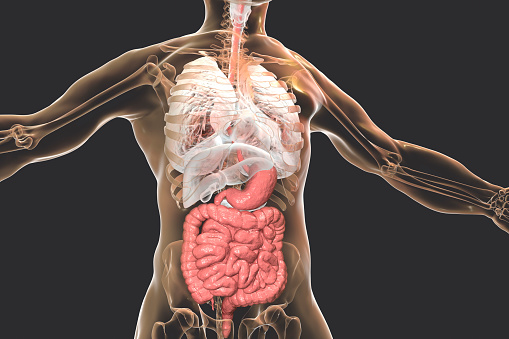The thymus, a large gland that normally lies beneath the breastbone of your chest, is responsible for selecting, training, and storing white blood cells. In other words, it’s our immune system’s boot camp—the thymus is like its physical embodiment of the phrase “If you don’t use it you lose it.”
But this isn’t its only function—not by a long shot! The thymus also houses stem cells that help mature our blood cells (this includes red blood cells), regulates bone growth and release hormones such as testosterone and estrogen. It also helps regulate sleep cycles and overall mood states! This little organ has a lot going on in there.
So how exactly does the thymus do all this?
The thymus begins to develop in the first trimester of conception, when your body determines which genes will be active and which won’t. If there’s something wrong with a gene, you’ll have trouble turning it on later in life, meaning that if you don’t get enough thymic activity during your early years, your immune system will suffer.
There are many studies linking low levels of thymic activity to autoimmune diseases such as Crohn’s disease , multiple sclerosis , type 1 diabetes and rheumatoid arthritis . And at the same time, low levels of thymic activity are associated with increased risk of certain forms of cancer .
This is because the thymus is responsible for the selection and training of white blood cells and their various subtypes. White blood cells are constantly attacking foreign pathogens in an attempt to keep your body safely balanced—to prevent any one pathogen from taking over.
Which lymphoid organ is primarily active during the early years of life?
The thymus :
You may have heard that your thymus is located in your chest, but it actually sits in the lower back. Surprisingly, it’s a fairly large organ that can weigh as much as two pounds. And despite this fact, it does not seem to be very useful for anything aside from immune system development!
Your thymus gland has a central core of lymphoid tissue and small lobules or pockets that have small lymphocytes within their walls. Within these lobules are central cavities called medullary sinuses which contain the cellular machinery responsible for making those white blood cells you need. The thymus is also home to a section of bone called the sternal bone , which contains lymphoid tissue.
The thymus begins to shrink during puberty, and by the time you reach 50, it has shrunk by as much as 80 percent! This is because the production of lymphocytes in your body has dropped significantly—so much so that your thymus has become unnecessary. The organ begins to atrophy and dies off almost entirely by the time you’re 70 years old.
Functions of thymus :
1. Lymphoid organ –
It generates T-lymphocytes , which are the cells that fight infections. The thymus is located in the upper chest behind the sternum (breastbone).
2. Endocrine organ –
It produces hormones, especially thymosins, which control white blood cell growth and maturation . These hormones also stimulate production of red blood cells . Tissues in the thymus also produce important proteins called cytokines , which regulate immune system activity. Thymic hormones are important for normal development of hormone-producing tissues and organs by stimulating their production.
3. Immune system –
Thymic hormones are also responsible for adjusting the body’s response to its environment or to threats such as bacteria, viruses or cancer cells.
4. Gut-brain function –
The thymus serves as a sort of central relay station or control center. For example, signals that come from the brain to control the growth of the digestive tract and control the nervous system go through this organ first before they reach other parts of the body.
5. Bones –
The thymus also helps regulate bone development and release hormones such as testosterone and estrogen . It is also important for normal development of hormone-producing tissues and organs by stimulating their production.
6. Sleep patterns –
White blood cells in the thymus regulate the body’s sleep patterns and growth.
7. Hormones –
Tissues in the thymus also produce important proteins called cytokines , which regulate immune system activity. Thymic hormones are important for normal development of hormone-producing tissues and organs by stimulating their production.
8. Stress –
White blood cells in the thymus are also involved with the body’s response to stress. They are responsible for making proteins that help to regulate stress responses, such as fighting infection or limiting inflammation.
9. Systemic response-
Thymic hormones also help control systemic immune system function. The thymus can produce these hormones from special nerve endings on its surface, but when it is not functioning normally there becomes a lack of feedback from this process and these feedback signals become too weak. As a result, an overreaction to minor stimuli like bacteria leads to inflammation, which can in turn lead to tissue damage and even organ failure (at least in the short term).











